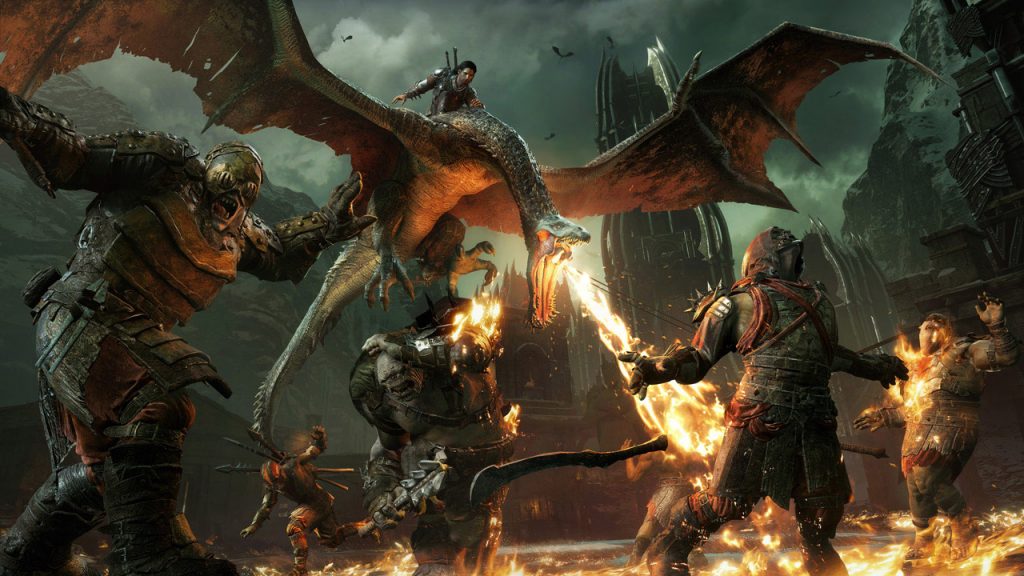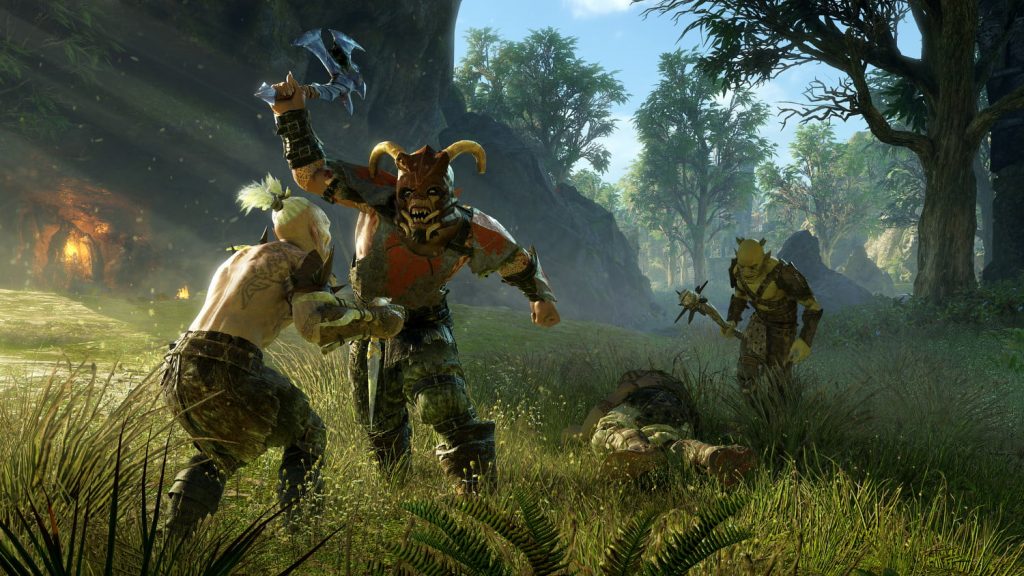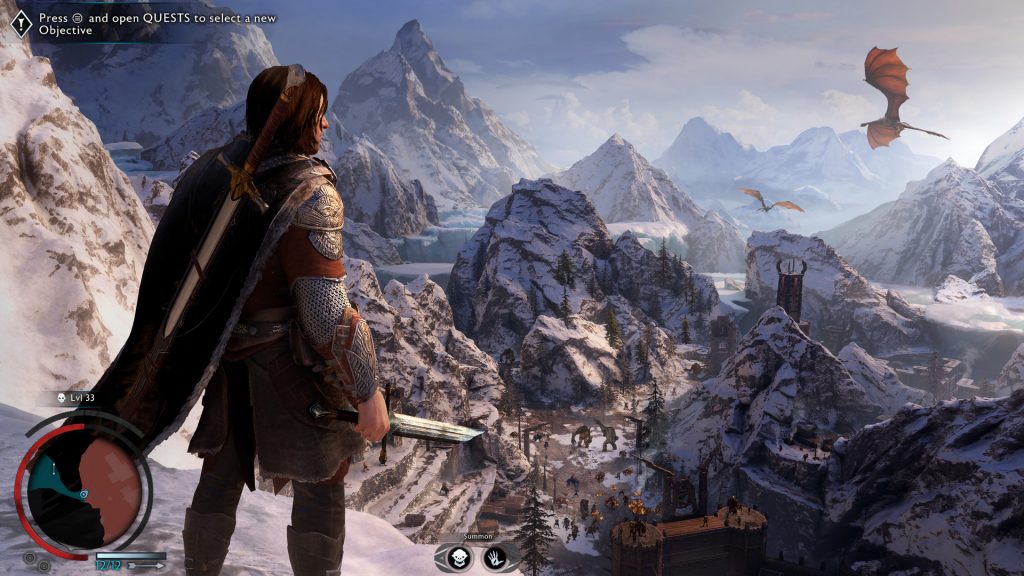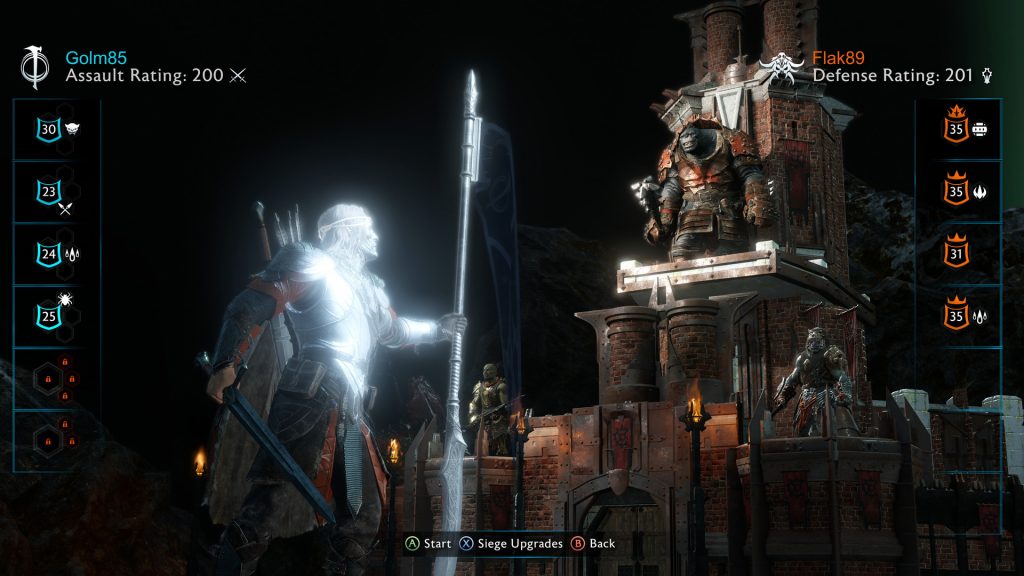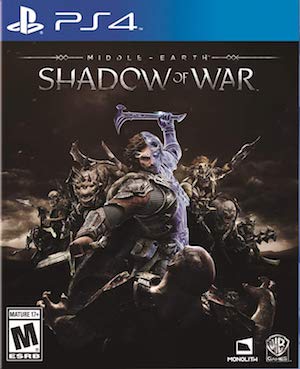
No one expected Middle-Earth: Shadow of Mordor to be as good as it was, and definitely no one expected it to be one of the best games of 2014. It was a very pleasant surprise, a game based on a license that borrowed heavily from various popular video game franchises- on paper it sounded like nothing special, but it just worked so well. With Shadow of War, developers Monolith are looking to continue what they started three years ago, and they’ve left no stone unturned in their attempt to outdo themselves.
Shadow of War is the ideal sequel. It’s essentially just more of its predecessor, but better, larger, more complex, and more polished. The Nemesis system was what defined and shaped Shadow of Mordor, and it’s become bigger in Shadow of War. The map you explore is larger, there are several different kinds of enemies, more ways to kill and dominate them, more skills and abilities to unlock, and more exciting ways to traverse the landscapes.
And traversal really is an absolute joy in Shadow of War. While it retains the Assassin’s Creed-esque parkour style of movement that its predecessor featured as well, it also makes tweaks to it to make it faster, more exciting, more fluid. For instance, you now have the ability to double jump, to change the direction of your jump mid-air. Combining this ability with others can lead to exciting moments, such as stylish executions, pinpoint silent headshots, and more.
"Combat is just as fluid and entertaining as ever as well. Chaining together dozens upon dozens of hits and perfectly timed counters can be a real joy once you manage to find a flow, and fights where you are slicing through entire battalions of orcs and trolls and an orc captain are often truly unforgettable."
Faster traversal is, of course, very important, since the map in Shadow of War is considerable larger than its predecessors. This is a large game, with a much larger world to explore, and thankfully, the world is dense and varied enough to justify its larger size. There’s tons of things to do all the time, and while some of them feel like meaningless side quests with no purpose but to fill up the map, many of these are genuinely interesting activities, raids, and side quests.
There’s also the fact that the landscapes you’ll be visiting throughout Shadow of War are much more appealing than the drab, dead locations we saw almost exclusively in Shadow of Mordor. The locations are a lot more varied, so you’ll be visiting cities both beautiful and old, forests, mountains, and more. Getting from point A to point B, as a result, can actually be worth skipping the fast travel every now and again.
Combat is just as fluid and entertaining as ever as well. Chaining together dozens upon dozens of hits and perfectly timed counters can be a real joy once you manage to find a flow, and fights where you are slicing through entire battalions of orcs and trolls and an orc captain are often truly unforgettable. There’s also the fact that the supporting stealth sections are often frustrating, and rely on rudimentary mechanics that don’t always work well, which means the game naturally leans more towards combat. The fact that these are moments of your own making and not ones that are scripted is, of course, worth noting too.
That said, the scripted moments themselves don’t fall short either. Shadow of War opens strongly, putting you squarely in the middle of the siege of Minas Ithil, Gondor’s last stronghold within the boundaries of Mordor. Watching Talion and his Wraith companion Celebrimbor get involved in this one-sided battle for reasons of their own is engaging stuff, and when the game starts using Tolkien’s lore in intriguing ways, such as binging in the backstories of Shelob and of Celebrimbor’s first assault on Mordor ages ago, the narrative can become truly entertaining.
"A lot of the characters you meet throughout the game are entirely forgettable, thanks to either generic writing or average voice work."
That’s not to say it’s a storytelling masterpiece. Shadow of War’s story does enough to grab your attention consistently, and fans of Tolkien’s Middle-Earth works will find plenty of stuff to dive into here, but that’s just as far as it goes. Unfortunately, there’s some stuff that can occasionally pull you out. A lot of the characters you meet throughout the game are entirely forgettable, thanks to either generic writing or average voice work. This is made all the more noticeable by the fact that the characters that are truly integral to the story and have significant roles are generally very well written and acted.
This same inconsistency can also be seen in the voice acting for the various orcs and orc captains you encounter, which is stranger in this particular case, since they’re all procedurally generated and none of them are really important to the game’s narrative than the others. And yet, some of them are very well voiced and written, full of character and personality, while others are cliché and stilted. The same can be said for the line of introduction each orc captain says when you first meet them- sometimes they’re smartly written and give a real personality to the orc captain in question, while other times they just drag on too long, which is made even worse by the fact that these introduction cutscenes are unskippable.
In the larger scheme of things, however, this inconsistency is not hard to overlook. Shadow of War is a game that relies on emergent gameplay, on player-made moments rather than scripted ones, and it has no qualms about that fact. The Nemesis system is, unsurprisingly, the star of the show in Shadow of War, just as it was in its predecessor, and thanks to a number of major additions, it’s even better than it was three years ago.
"Shadow of War also makes significant changes to the skill trees and the upgrade mechanics, which, as you can imagine, have a pretty big impact on how you play the game."
Fortresses are the big new mechanic in Shadow of War, and they’re excellent. They add a sense of larger purpose to the Nemesis system, so that while you’re taking down orc captains in Mordor’s army and building your own vendetta stories with certain characters you meet, you’ll also be building an army of your own, and using these armies to take down entire fortresses. These fortresses are occupied by an Overlord each, and each of these Overlords have their subordinate Warchiefs- the bosses and the mini-bosses, if you will.
And planning your attack, laying siege to these fortresses, weakening the enemy by taking out their Warchiefs are often collectively the best moments of the game. These fortress sieges add an impressive level of strategy and tactics to the game. You have to decide which of your own orc captains you bring, keeping in mind their own strengths and weakness, which units they will bring, whether or not they will have siege units. Getting your army together, putting together a plan and then watching it all come together can be truly glorious.
The battles during these sieges themselves, though, can be a little inconsistent at times. These are the times when Shadow of War becomes the most hectic, with insane numbers of enemies on the screen at the same time, and most of the times, they’re all different types, with unique strengths and weaknesses. Many of these are often captains, who often have very specific ways of fighting, and juggling all of this together in the middle of frantic sieges can be a little chaotic. Shadow of War’s combat excels when it lets you find a rhythm, which is why moments like these which break your flow in the middle of combat for no reason but how crowded they are all the more frustrating.
Shadow of War also makes significant changes to the skill trees and the upgrade mechanics, which, as you can imagine, have a pretty big impact on how you play the game. After unlocking your main abilities, you now have to select one of several available minor upgrades for each of them- and only one of them can be active at a time. This means that you can now upgrade and customize Talion the way you see fit, upgrade his abilities to suit the way you play, rather than following a strict path the game has set for you.
"Shadow of War is not perfect, and it needs polish and refinement in a few areas, but thanks to its addictive loop of emergent gameplay and the sheer number of things to do here, it’s definitely a game worth playing."
From a technical standpoint, Shadow of War is, despite a few rough edges, pretty decent. It’s not a bad looking game, and some of the landscapes it portrays are beautifully rendered, while the varied enemy design and the way Tolkien’s world has been brought to life has to be appreciated as well. Still, there are some rough textures here and there, while some of the character models lack detail and have choppy animations and lip syncing. These are minor issues, yes, but they don’t go unnoticed.
I also feel like I have to mention the microtransactions. To be fair, the microtransactions in Shadow of War are nowhere near as ridiculous as what you might see in so many other games, and the content that is available for purchase can also be obtained in the game itself through grinding. Of course, that means a whole lot of grinding, and while it isn’t very obtrusive, the presence of microtransactions in a single player full priced game is still a little bizarre, to say the least.
Shadow of War is, ultimately, exactly what it needed to be. Its predecessor started off very well and set up a solid foundation to build on, and with the sequel, Monolith have managed to improve and evolve in all the ways one could have wanted them to. Shadow of War is not perfect, and it needs polish and refinement in a few areas, but thanks to its addictive loop of emergent gameplay and the sheer number of things to do here, it’s definitely a game worth playing.
This game was reviewed on the PlayStation 4.
Combat is exciting and addictive; Large map and varied locations; Addictive emergent gameplay; Nemesis system is bigger and better thanks to fortress sieges; Lore and narrative collectively do enough to keep players interested; Fluid and fast traversal.
Minor yet noticeable technical issues; Inconsistent writing and voice acting; Hectic siege battles can lead to frustrating moments during combat; Unskippable orc captain introduction cutscenes; Microtransactions.









